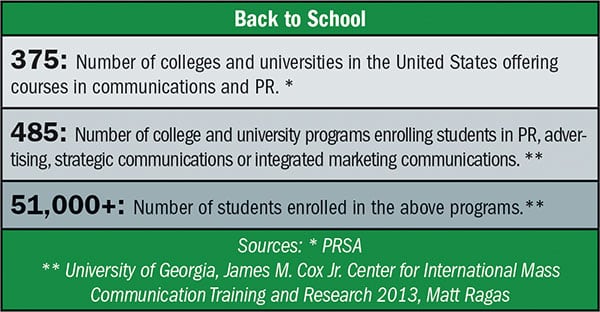
It’s summer in many parts of the country. Still, with announcements about college football beginning and the approach of Labor Day, it’s time to think about heading back to school. Some schools already have begun their fall terms, others will be starting imminently.
To get you, our readers, in the right frame of mind, this two-part series begins by asking a bevy of veteran in-house and agency communicators to discuss the latest trends in the field and how they are being taught (or not) at colleges and graduate schools. Their responses are included in this week’s edition. In our next edition, we’ll present the academics’ responses to similar questions.
For example, we asked PR pros how ready college graduates are when they enter the work world. We also inquired of our PR pros whether or not young communicators who’ve studied PR and communications in college or grad school are significantly better prepared than those who have not. And we asked our PR pros what recommendations they would make to academics to help raise the level of PR and communications education. In many cases we selected in-house and agency executives who are closely involved with hiring and mentoring young communicators. To be more strategic, our academics all are former or current PR practitioners.
In our next issue we’ll ask academics a series of related questions. For example, how they incorporate the latest trends into their classes. We also throw out budgets for one question, asking our academics what would add to the curriculum to produce better PR pros?
First up, the PR pros.
Skill Level Assessment
Assess the skill level and readiness of young hires to work in PR and communications: Most of our PR pros hailed the work ethic and skill set of young hires. “I am impressed by the job readiness of new graduates in several respects, including critical and strategic thinking, comfort and knowledge with digital media platforms, readiness to test and learn with new, emerging platforms and strategies and a willingness to work outside of “normal” work hours or harder than anyone in the room to stand out,” says Linda Rutherford, VP, CCO, Southwest Airlines.
Charlene DeBar, manager, corporate communications, Toshiba America Medical Systems, was representative of many of our pros who said young hires “are incredibly adept at digital and social communication. It’s the world they’ve grown up in, and seasoned professionals can learn a lot from newcomers in this area.”
DeBar and Stephen Payne, VP, corporate communications, Feld Entertainment, believe young pros’ facility with new technologies make them highly adaptable and more agreeable to accept change. Adds Eric Hollreiser, VP, corporate communications, Amaya Inc. and PokerStars, social media means today’s new hires “are literally growing up as content creators and mass communicators. And they have a global view from a very early age.”
Lisa Ramsey, director, leadership & employee communications, U.S. commercial, at pharma brand Abbvie, also has seen the global view of young hires. Ramsey, who runs Abbvie’s intern program, appreciates the work large and small colleges do to ensure “students have well-rounded experiences in multiple media formats. Many of the students I’ve interviewed hold more than one major or earn concentrations in specific areas that give them an edge—in business, marketing or a language.” Becky Boles, an SVP who runs APCO Worldwide’s program for young hires, says “people are graduating from university today with more exposure to real-world communications than ever.” She points to student-run agencies and internships as critical.
Adds Denise Vitola, managing director at Makovsky, young hires who’ve had internships arrive with “a level of what it takes to succeed [at an agency]…[but] those who have not had internships can often be surprised at what skills they need and the type of work that needs to be done,” she says. “Of course we need strong writers and thinkers, but I believe the building blocks of focusing on being a taskmaster get lost.”
While Paul Englert, VP, marketing, C. Mondavi & Family, agrees that young hires are “more prepared than ever” with social media and technology, he’s noticed “a tendency for younger PR professionals to too quickly dismiss traditional media and PR fundamentals. It will be important that we continue to reinforce the influence of traditional PR as we embrace the continual evolution of our field,” he says. Brian Kelley, director, Sage Communications, finds young hires “are often soft in important skills besides social media, such as pitching, longer-form writing and confidence on the phone.”
Bob Pearson, president, W2O Group, goes further. “Most of what you need to learn will happen on the job, more so than ever,” he says. “New hires will need to become fluent in analytics, understand search, how paid media works and more. All things communicators didn’t worry about long ago.”
Does College/Grad School Matter?
Are young hires who’ve studied PR/communications better prepared than those who haven’t?Responses varied on this question, from Kelley of Sage saying communications grads “are definitely better prepared,” to Boles of APCO, who says, “I don’t think [they] are any more or less prepared,” though she adds the learning curve “might be easier for those who’ve studied communications.”
Pearson of W2O feels communications grads have an edge in that “the fundamentals of telling a story, understanding how to create an idea or write a plan or news release matter a lot. Storytelling is part of the DNA of great communicators and the best schools teach this well.”
Abbvie’s Ramsey sees an edge for communications students, but it’s slight. “The new hires who are most successful are the ones who’ve had either classroom or extracurricular experiences that mimic much of what PR/communications professionals do on a daily basis: balancing multiple priorities, meeting deadlines (such as by working on a daily or weekly online publication), holding writing and/or editorial responsibility for a publication. I also look for candidates who have held leadership positions in extracurricular or volunteer organizations.” Vitola of Makovsky agrees with Ramsey that the edge is slight, adding, “Young hires are exactly that, young, so they need to learn the true ins and outs of the job as well as the skills they need to develop.”
Feld Entertainment’s Payne feels communications graduates “speak the language of our craft more so than other graduates.” Mondavi’s Englert sees more confidence in those who’ve studied communications, yet, “It’s not uncommon that a young hire with a liberal arts background can demonstrate greater creativity by drawing from…literature or philosophy to provide truly provocative work.”
For DeBar of Toshiba, “Those who studied PR and communications at least have the basics down, which gives them a definite advantage. You don’t have to explain what a press release is or how to write one.” But formal study isn’t the only route. “Experience is the key to success. Students who have gained practical experience with internships at large companies and agencies tend to be more prepared…”
When hiring entry-level talent, Boles is “less concerned about a candidate’s degree than experience, personality and skill set…we’re looking for candidates who are strong writers, communicators and analytical thinkers—and those skills aren’t limited to communications grads.” PokerStars’ Hollreiser agrees with Boles. “I’ll more often take a super-smart, aggressive, passionate and articulate young candidate who studied, say, history, over someone who studied PR/communications,” he says.
Grabbing an Academic’s Ear
What PR pros would tell academics: For those of you who recall a 2013 study by the Council of Public Relations Firms, you won’t find these responses surprising. Nearly all our PR pros believe academics should emphasize writing skills to students. “It seems obvious,” says Ramsey, “but it’s surprising how many young professionals do not write well.”
Close behind, in both the study and with our pros, was the need to develop students’ business and analytical abilities. At least teach business fundamentals, Hollreiser urges. “PR pros don’t necessarily need an MBA, but the greater their understanding of business and the impact communications has on the bottom line, the better their counsel will be.” Internships also were stressed.
Other responses: Says Pearson, “Teach media, not PR. In the PR world, we need to know how paid, earned, shared and owned media work together. Don’t teach one part of the equation. That’s old school.” Vitola adds, “Move beyond teaching traditional PR. We are [in the business of] integrated marketing and we need talent who knows PR, but also understands digital and design, among other things.” Boles urges academics to push students to build their professional networks as they’ll have a better chance of getting a job. She also likes work outside PR. “Working at a fast-food restaurant…could offer valuable insights when pitching a…client, …volunteering at a hospital…could uncover a passion for healthcare communications.” Mondavi’s Englert urges academics to force students “out of their comfort zone…challenge them with impossible tasks...this will prepare them for real-world challenges.” Payne urges academics to expose students to diverse reading material and engage them in debate. “Our business is after all about persuasion. Whether a pitch for a client or dealing with issues management or crisis, it’s a contest of ideas.” Adds Ramsey, “Stress the importance of speaking well in person and on the phone.” Asking good questions is another skill Ramsey emphasizes. “Many young professionals feel it’s an imposition to ask questions.”
Rutherford, the CCO at Southwest Airlines, gets the final word. “I’ve seen collegiate programs begin to offer courses in soft skills, such as executive presence, confidence in presenting at all levels…and influencing beyond positional authority,” she says. “So much work is matrixed…into cross-functional teams that even a junior” communicator “could be on a complex project with others more senior. Those kinds of skills—how you show up—are becoming more critical in our roles as chief integrators.”

CONTACT: [email protected] [email protected] [email protected] [email protected] @erichollreiser [email protected] [email protected] [email protected] [email protected] [email protected]
This content appeared originally in PR News Pro, August, 29, 2016. For subscription information, please visit: https://www.prnewsonline.com/about/info
